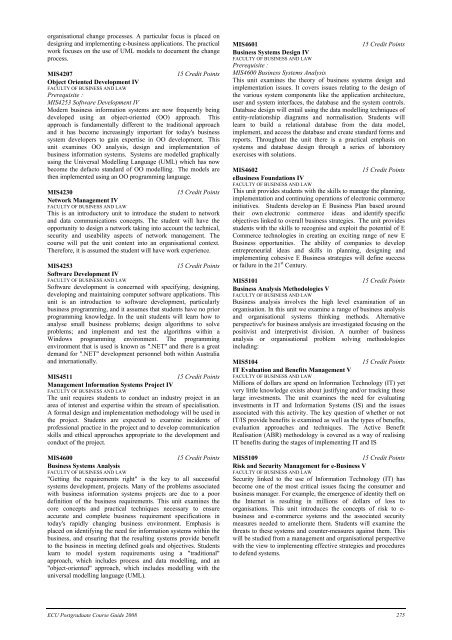Postgraduate - Edith Cowan University
Postgraduate - Edith Cowan University
Postgraduate - Edith Cowan University
You also want an ePaper? Increase the reach of your titles
YUMPU automatically turns print PDFs into web optimized ePapers that Google loves.
organisational change processes. A particular focus is placed on<br />
designing and implementing e-business applications. The practical<br />
work focuses on the use of UML models to document the change<br />
process.<br />
MIS4207 15 Credit Points<br />
Object Oriented Development IV<br />
FACULTY OF BUSINESS AND LAW<br />
Prerequisite :<br />
MIS4253 Software Development IV<br />
Modern business information systems are now frequently being<br />
developed using an object-oriented (OO) approach. This<br />
approach is fundamentally different to the traditional approach<br />
and it has become increasingly important for today's business<br />
system developers to gain expertise in OO development. This<br />
unit examines OO analysis, design and implementation of<br />
business information systems. Systems are modelled graphically<br />
using the Universal Modelling Language (UML) which has now<br />
become the defacto standard of OO modelling. The models are<br />
then implemented using an OO programming language.<br />
MIS4230 15 Credit Points<br />
Network Management IV<br />
FACULTY OF BUSINESS AND LAW<br />
This is an introductory unit to introduce the student to network<br />
and data communications concepts. The student will have the<br />
opportunity to design a network taking into account the technical,<br />
security and useability aspects of network management. The<br />
course will put the unit content into an organisational context.<br />
Therefore, it is assumed the student will have work experience.<br />
MIS4253 15 Credit Points<br />
Software Development IV<br />
FACULTY OF BUSINESS AND LAW<br />
Software development is concerned with specifying, designing,<br />
developing and maintaining computer software applications. This<br />
unit is an introduction to software development, particularly<br />
business programming, and it assumes that students have no prior<br />
programming knowledge. In the unit students will learn how to<br />
analyse small business problems; design algorithms to solve<br />
problems; and implement and test the algorithms within a<br />
Windows programming environment. The programming<br />
environment that is used is known as ".NET" and there is a great<br />
demand for ".NET" development personnel both within Australia<br />
and internationally.<br />
MIS4511 15 Credit Points<br />
Management Information Systems Project IV<br />
FACULTY OF BUSINESS AND LAW<br />
The unit requires students to conduct an industry project in an<br />
area of interest and expertise within the stream of specialisation.<br />
A formal design and implementation methodology will be used in<br />
the project. Students are expected to examine incidents of<br />
professional practice in the project and to develop communication<br />
skills and ethical approaches appropriate to the development and<br />
conduct of the project.<br />
MIS4600 15 Credit Points<br />
Business Systems Analysis<br />
FACULTY OF BUSINESS AND LAW<br />
"Getting the requirements right" is the key to all successful<br />
systems development, projects. Many of the problems associated<br />
with business information systems projects are due to a poor<br />
definition of the business requirements. This unit examines the<br />
core concepts and practical techniques necessary to ensure<br />
accurate and complete business requirement specifications in<br />
today's rapidly changing business environment. Emphasis is<br />
placed on identifying the need for information systems within the<br />
business, and ensuring that the resulting systems provide benefit<br />
to the business in meeting defined goals and objectives. Students<br />
learn to model system requirements using a "traditional"<br />
approach, which includes process and data modelling, and an<br />
"object-oriented" approach, which includes modelling with the<br />
universal modelling language (UML).<br />
MIS4601 15 Credit Points<br />
Business Systems Design IV<br />
FACULTY OF BUSINESS AND LAW<br />
Prerequisite :<br />
MIS4600 Business Systems Analysis<br />
This unit examines the theory of business systems design and<br />
implementation issues. It covers issues relating to the design of<br />
the various system components like the application architecture,<br />
user and system interfaces, the database and the system controls.<br />
Database design will entail using the data modelling techniques of<br />
entity-relationship diagrams and normalisation. Students will<br />
learn to build a relational database from the data model,<br />
implement, and access the database and create standard forms and<br />
reports. Throughout the unit there is a practical emphasis on<br />
systems and database design through a series of laboratory<br />
exercises with solutions.<br />
MIS4602 15 Credit Points<br />
eBusiness Foundations IV<br />
FACULTY OF BUSINESS AND LAW<br />
This unit provides students with the skills to manage the planning,<br />
implementation and continuing operations of electronic commerce<br />
initiatives. Students develop an E Business Plan based around<br />
their own electronic commerce ideas and identify specific<br />
objectives linked to overall business strategies. The unit provides<br />
students with the skills to recognise and exploit the potential of E<br />
Commerce technologies in creating an exciting range of new E<br />
Business opportunities. The ability of companies to develop<br />
entrepreneurial ideas and skills in planning, designing and<br />
implementing cohesive E Business strategies will define success<br />
or failure in the 21 st Century.<br />
MIS5101 15 Credit Points<br />
Business Analysis Methodologies V<br />
FACULTY OF BUSINESS AND LAW<br />
Business analysis involves the high level examination of an<br />
organisation. In this unit we examine a range of business analysis<br />
and organisational systems thinking methods. Alternative<br />
perspective's for business analysis are investigated focusing on the<br />
positivist and interpretivist division. A number of business<br />
analysis or organisational problem solving methodologies<br />
including:<br />
MIS5104 15 Credit Points<br />
IT Evaluation and Benefits Management V<br />
FACULTY OF BUSINESS AND LAW<br />
Millions of dollars are spend on Information Technology (IT) yet<br />
very little knowledge exists about justifying and/or tracking these<br />
large investments. The unit examines the need for evaluating<br />
investments in IT and Information Systems (IS) and the issues<br />
associated with this activity. The key question of whether or not<br />
IT/IS provide benefits is examined as well as the types of benefits,<br />
evaluation approaches and techniques. The Active Benefit<br />
Realisation (ABR) methodology is covered as a way of realising<br />
IT benefits during the stages of implementing IT and IS<br />
MIS5109 15 Credit Points<br />
Risk and Security Management for e-Business V<br />
FACULTY OF BUSINESS AND LAW<br />
Security linked to the use of Information Technology (IT) has<br />
become one of the most critical issues facing the consumer and<br />
business manager. For example, the emergence of identity theft on<br />
the Internet is resulting in millions of dollars of loss to<br />
organisations. This unit introduces the concepts of risk to ebusiness<br />
and e-commerce systems and the associated security<br />
measures needed to ameliorate them. Students will examine the<br />
threats to these systems and counter-measures against them. This<br />
will be studied from a management and organisational perspective<br />
with the view to implementing effective strategies and procedures<br />
to defend systems.<br />
ECU <strong>Postgraduate</strong> Course Guide 2008 275



